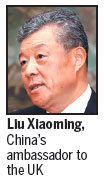US, DPRK hold key to peninsula nuke issue
Liu Xiaoming, Beijing's ambassador to London, has said China is not the key to solving the nuclear issue on the Korean Peninsula and has called for negotiations and dialogue to defuse tensions.
The latest nuclear test by the Democratic People's Republic of Korea drove up regional tension and raised international concerns. Some Western media blamed China for not doing enough to curb the DPRK.

?
In a signed article published by The Daily Telegraph on Friday, Liu, who served as China's ambassador to the DPRK before taking the diplomatic reins in the UK, dismissed such criticism and said China was not the key to solving the crisis. He said China wants peace on the Korean Peninsula, and noted that the key to solving the crisis lies with the United States and the DPRK.
"China's contribution to resolving the Korean nuclear issue is there for all to see," Liu wrote. "As a close neighbor and a permanent member of the UN Security Council, China has always kept in mind the big picture of maintaining regional peace and stability, and made tireless and persistent efforts to facilitate a negotiated solution."
"It was thanks to China's hard work, with the support of other parties, that the diplomatic efforts, from Three-Party Talks to Six-Party Talks, were able to sustain momentum and produce three joint documents between 2003 and 2007," he said.
A joint statement on Sept 19, 2005, outlined a road map for the DPRK to follow to abandon its nuclear program and for lasting peace to be realized on the Korean Peninsula.
Liu said China has comprehensively and strictly implemented all 16 Security Council resolutions since 2006, and reached out extensively to other parties to promote peace talks. China's role has been "active, responsible and constructive".
The veteran diplomat added, "To find the key to the Korean nuclear issue, one must understand the 'lock'." Liu said security, or a sense of insecurity due to serious mistrust between the DPRK and the US, lies at the center of the tension.
"It is up to the two parties that hold the key to apply the right cure by demonstrating good faith for dialogue and by working toward the goal of preventing the escalation of tensions," he said.
Liu added that China was ready to help, "but you cannot put out a fire if someone continues to pour oil over it, or find fault with or even frustrate firefighting efforts".
"Eight years of Six-Party Talks showed that peace on the Korean Peninsula could be maintained and progress toward denuclearization remains attainable as long as there is dialogue," Liu said.
When talks stalled in 2008, the situation drifted. The DPRK quickened the development of its nuclear and missile technologies and has since conducted six nuclear tests and fired dozens of missiles.
To halt the deterioration, China has proposed "double suspension" - that the DPRK suspend its nuclear-related activities and the US suspend its military drills with the Republic of Korea - and a return to negotiations.
























